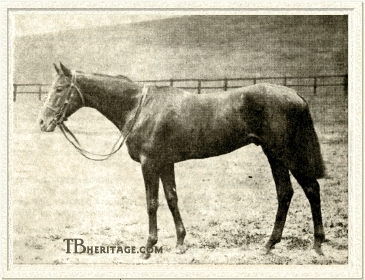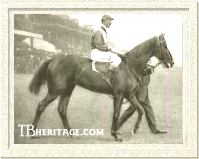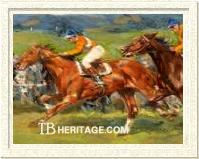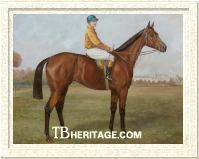|
|
Winkfield's Pride

|
|
 |
|
|
Winkfield's Pride was a promising juvenile in Ireland that matured into a versatile winner of good races at distances between 9 and 12 furlongs. He got three classic winners in France, but after his initial success at stud, he was sold and his subsequent offspring did not reach those heights. Of his two most promising sons, one died young and the other was sent to stud in Russia.
|

His grandsire, the undefeated Barcaldine
| |
His sire, Winkfield (1885), was a 15.3 hand chestnut colt by the great undefeated Barcaldine, and out of a Beadsman daughter, Chaplet. Unlike his younger brother, Morion (1887), who won the Ascot Gold Cup and other good races, Winkfield did little on the turf, running mostly at the selling plate level. He won the Ovindean Plate at Brighton, a small race at Newmarket, and the county Stand Plate at Liverpool in seven starts. Retired to stud, he was later sold for 1,500 guineas to J.C. Sullivan, who sent him to his Kilberry Stud, near Navan, Ireland, where he proved to be a somewhat better stallion than a race horse. |
In addition to Winkfield's Pride, he got the filly Valenza (1898), who won Epsom's Coronation Cup, and the good stayer Bachelor's Button (1899), who won sixteen races, including the Doncaster Cup, the Ascot Gold Cup, Newmarket's Champion Stakes, and the Ascot Gold Vase, twice.
Winkfield's Pride's dam, the chestnut Alimony (1889), was by the great stayer and sire, Isonomy. She was an unraced roarer Sullivan had purchased at the 1891 Doncaster sales as a two-year old, largely on the basis of her pedigree. Her dam, Alibech (1883), by Derby winner Hermit (from whom Alimony likely inherited her roaring tendency), would later prove to be a good producer, being the dam of Soliman (1892), winner of the Great Metropolitan Handicap and later a good sire; of Son O'Mine (1891), an indifferent runner but sire of the good French distance horse Querido and the French 1,000 Guineas winner Bolide II; and of Osbech, who won the Liverpool Cup and Jockey Club Cup, among other races. The handsome, blaze-faced chestnut colt, Winkfield's Pride, was Alimony's first foal, born in 1893.
Winkfield's Pride on the Turf
Winkfield's Pride ran for four seasons, ages two through five. He proved to be a high-class handicap runner, but when tested against the classic winner Persimmon in the Ascot Gold Cup, he was beaten by eight lengths, with Love Wisely four lengths behind Winkfield's Pride.
His juvenile year, in Ireland, brought him four wins in six starts: Cork's Lee Plate, and the Stewards' Plate, Irish Breeders' Plate and Railway Stakes at the Curragh, the latter over 6 furlongs. His big win was in the Stewards' Plate, where he beat a highly regarded two-year-old, City and Whitsuntide Plate (Manchester) and Waterford Testimonial Stakes (Curragh) winner Bellevin, receiving 9 pounds from him.
Early in his three year old year he ran unplaced at the Curragh, and then Sullivan shipped him England for training at W.T. Robinson's Foxhill stables. He did nothing at Manchester or in Goodwood's Stewards' Cup, and came to Newmarket's 9 furlong (his first time at the distance) Cambridgeshire Handicap at odds of 5 to 1, having had a secret trial where he indicated he could easily beat, with the weight he was receiving, the stable's other entry and former favorite, Dinna Forget. He won the race in a canter, beating a good field that included the good mare Laodamia, Dinna Forget, Omnium II, Sir Visto, Marco, Canterbury Pilgrim, Thais, La Sagess, and a host of other, later famous horses. He went unplaced in the Derby Handicap, and ran second in the Manchester November Handicap, his last race of the season.
At age four he started by winning the 8 furlong Lincolnshire Handicap; then came his well-beat second in the 2-1/2 mile Ascot Gold Cup to Persimmon. He next won the Doncaster Cup over a sole opponent, Jaquemart. Shipped to Paris, he ran in and won the 12 furlong Prix du Conseil Municipal in a canter, beating some good French runners, Jeanne Brunette (receiving 17 pounds), Vidame, Elf, Omnium II, and Champaubert, among others. At age five he ran third in the Epsom Cup over 12 furlongs, and then was sent back to Paris to contest the Prix du Conseil Municipal again, where he ran fourth to Gardefeu, Dinna Forget and Machiavel. The next day he was purchased by French breeder Edmond Blanc for 7,000 guineas, and was retired to Blanc's Haras de Jardy.
Winkfield's Pride in the Stud
Winkfield's Pride got his best runners while at Haras de Jardy at the outset of his stud career, between 1902, the time his first crop ran, and 1905; after that, the general quality of his offspring declined, although he had some good winners, none matched his early youngsters. Almost half his winners were, like him, good juveniles. He also, true to his male line, got some good jumpers in France.
Blanc had been approached by German buyers regarding the purchase of Winkfield's Pride, and rather than send him to Germany, he was persuaded to lease the horse to Count Gerard de Ganay, who later bought him outright. Winkfield's Pride's shift to the de Ganay Haras de Fougerette proved disasterous to his stud career, where he sired few runners of generally indifferent quality. Towards the end of his career he was resold to Victor Duret, who had managed the stud at Jardy, and who placed Winkfield's Pride at his stud Haras de Vaucresson, and the horse experienced a modest upswing in good runners the year before his death in the fall of 1918.
|

The short-lived Finasseur

Quo Vadis winning Grand Prix de Paris

Holbein

Profane
| | FINASSEUR was Winkfield's Pride's best son, bred and raced by Blanc, winner of seven races and a total of £25,586. He was a chestnut, born in 1902, out of the Clamart mare, Finaude, who produced nothing else like him. His wins included the Prix du Jockey Club and the Grand Prix de Paris, as well as the Prix du President de la Republique and the Grand Prix de Bruxelle. His earning helped propel Winkfield's Pride to second on the leading sires list to Flying Fox in France in 1905, with winners of £28,252. Unfortunately, in 1909, he became fractious in his stall and broke his pastern, and was put down on the spot, having only serviced a few mares.
QUO VADIS (1900), from Filomena, by Petrarch, was Winkfield Pride's second-highest earner, with a total of £14,083 earnings and three wins, including the Grand Prix de Paris and the 2500 meter Prix Noailles. He was second to Ex Voto in the Prix du Jockey Club, and third behind Caius in the Prix Lupin. At the end of his three year old season he was sold to the Russian Imperial Stud. His dam also produced Prix Royal Oak winner Fer to the cover of St. Serf. A sister to Quo Vadis, DAHABEAH (1904) became tail-female ancestress of some good French winners in Family 4 - i.
Of Winkfield's Pride's other sons, the in-bred chestnut LORLOT (1901), from Lina Lacket, by Hermit, won fifteen races, who won the Prix de Reves d'Or, the Prix de la Foret, and thirteen other races, and ran second to Ecots in the Prix de Deauville. HOLBEIN (1905), from the Hampton daughter, Hurry, won the 2100 meter Prix Lupin and six other races. ITALUS (1907), from Italie, by Courlis, won ten races, and was second to Verdun in the French 2,000 Guineas.
His best running daughter was PROFANE (1901), out of Poupee, by Reverend. She ran second to Xyelene in the French 1,000 Guineas, and then went on to win the three big races for three year old fillies in France, the Prix de Diane (French Oaks), the Prix de Flore, and the Prix Vermeille. Her wins and placings totalled £7,128, making her Winkfield's Pride's fourth biggest earner. She produced nothing of note as a broodmare.
Two of Winkfield's Pride's daughters, PIVOINE (1905), and NAILA (1907) were excellent producers in Chile. PIVOINE was imported by Mario Vales Ortuzar for Haras Cunaco. In Chile, she produced Morny, by Marte II, purchased as a saddle horse but then placed in training, winning ten of her thirty-three races, including the Luis Cousino, the Luis Aldunate and the Augustin R. Edwards. Pivoine's daughter by Burgomaster, Portugal (1918), won Chile's classic Potrillo de Polentas for Stud Bernstein. Another of her daughters by Burgomaster, Baylen, won a number of races for Thomas Hurley, including the Jose Luis Larrain and the Luis Cousino.
|
NAILA was acquired by Harax Pirque. Covered by the top runner and sire Pippermint, she produced the great filly Pimponia, who won many races in Argentina, including the Gran Polla de Productors, the Jockey Club Argentino, and the Paddock Stakes. She later produced good winners Los Andes and Albano. Naila also produced Vesta (1917), by Olascoaga, winner of the Chile's Las Oaks and El Debut, among other races. Vesta's sister, Nirvana (1923), won a a number of races in Chile, including the Saint Leger and the Premio Guillermo Errazuriz Urmeneta.
Other daughters of Winkfield's Pride who were good producers included ACTE (1900), out of Artistic, by Paradox, who produced Austerlitz to the cover of Signorino; he won the Gran Premio di Milano. FLEUR DE JEUNNESSE (1904), from the Childwick daughter Mmle. de Jambville bred the Italian Oaks winner Galliflora (1912, by Galeazzo). THAIS II (1903) had a daughter, Guerroyante (1911, by Flying Fox), who won the Zukunfts Rennen, and later produced a good daughter, Guerriere II (1918), winner of nine races in France, including the Prix Robert Papin and the Prix Jacques le Marois at Deauville. Another daughter, YALLA (1903), from a St. Simon daughter, Malte, was second dam of Kincardine, a winner of Ascot's St. James's Palace Stakes and sire, in New Zealand, of Kindergarten, a long-running gelding in New Zealand who won 25 of his 35 races, including the New Zealand St. Leger.
--Patricia Erigero
|
|
|
|

